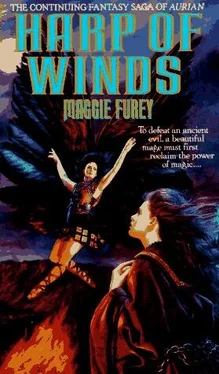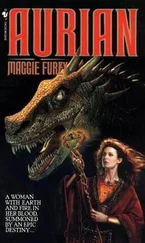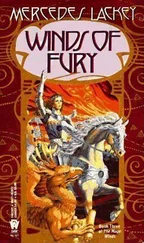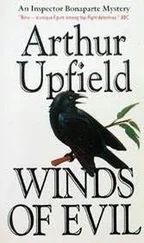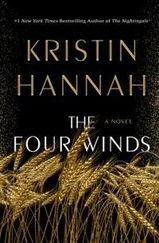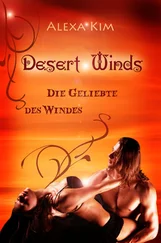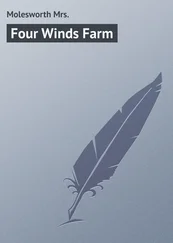Maggie Furey - Harp of Winds
Здесь есть возможность читать онлайн «Maggie Furey - Harp of Winds» весь текст электронной книги совершенно бесплатно (целиком полную версию без сокращений). В некоторых случаях можно слушать аудио, скачать через торрент в формате fb2 и присутствует краткое содержание. Жанр: Фэнтези, на английском языке. Описание произведения, (предисловие) а так же отзывы посетителей доступны на портале библиотеки ЛибКат.
- Название:Harp of Winds
- Автор:
- Жанр:
- Год:неизвестен
- ISBN:нет данных
- Рейтинг книги:4 / 5. Голосов: 1
-
Избранное:Добавить в избранное
- Отзывы:
-
Ваша оценка:
- 80
- 1
- 2
- 3
- 4
- 5
Harp of Winds: краткое содержание, описание и аннотация
Предлагаем к чтению аннотацию, описание, краткое содержание или предисловие (зависит от того, что написал сам автор книги «Harp of Winds»). Если вы не нашли необходимую информацию о книге — напишите в комментариях, мы постараемся отыскать её.
saga unfolds in a sweeping blaze of glory, terror, and mystic enchantment, as Lady Aurian and her lover Anvar return to the holy city of Nexis to find that the crazed Archmage Miathan’s sorcery has unleashed cataclysmic forces, locking the land in the icy grip of eternal winter.
Harp of Winds — читать онлайн бесплатно полную книгу (весь текст) целиком
Ниже представлен текст книги, разбитый по страницам. Система сохранения места последней прочитанной страницы, позволяет с удобством читать онлайн бесплатно книгу «Harp of Winds», без необходимости каждый раз заново искать на чём Вы остановились. Поставьте закладку, и сможете в любой момент перейти на страницу, на которой закончили чтение.
Интервал:
Закладка:
“Steelclaw!” Chiamh gasped, thinking of the Haunted Mountain that lay beyond the Wyndveil. No Xandim would set foot there—legend said that anyone who spent a night on Steelclaw would return insane, if they returned at all. The mountain itself was enough to discourage the bravest or most foolhardy soul—Chiamh had always known that some unthinkable disaster had befallen it. The rock had been riven and twisted, tortured and melted, almost down to its roots, leaving three jagged stumps to claw the sky. The very sight of it made the Windeye think of pain.
“Steelclaw indeed,” Basileus answered. “The remains of Ghabal, once the tallest and fairest of us all! Had the Wizards let the matter rest there . . . But in their wrath, they punished us all. They took the Dwelven—our eyes and ears in the land and the only ones, save themselves, who could hear us—beyond the sea whence they could not return. The Wizards sent them underground and laid a spell on them, that if they emerged into the light, they would perish. Without them we have languished in isolation, trapped in a waking dream. But now, we may dare to hope again—for the world is changing!. Not long ago, my mind began to awaken and reach out again—to find you, though you were not the reason. The Staff of Earth is abroad once more! I feel it coming closer!” The Moldan’s tone betrayed his excitement. “Those Wizards are up to something, or I’m a pebble! Little Windeye, know you aught of this?”
Chiamh frowned. “Perhaps,” he said. “Last night I had a Vision, and now Outlanders have appeared in our lands ...”
Quickly, he told Basileus what had been happening.
“Indeed,” the Moldan agreed, when he had finished. “These matters cannot be unconnected. And you believe your leaders will execute these strangers?”
“For certain—that is our law.”
“In that case, we must act swiftly to save them . . .”
“Could you help me get them out?” Chiamh asked eagerly. “Could you open a passage out of the dungeon, maybe?”
“Alas,” Basileus sighed, “it would take far too long to create such a passage—and it would be of no avail. The prisoners have been taken elsewhere ...”
“What?” Chiamh shrieked. “But their execution is not until tomorrow!”
“You have lost track of the hours, little Windeye! You were long within my body finding the dungeons, and longer coming back. And when you returned you slept before we spoke. By your lights, it is already tomorrow! To save the captives, you must move swiftly—if it is not already too late!”
6
Steelclaw
In contrast to the close and narrow gloom that shrouded Chiamh’s Valley of the Dead, the plateau of the Wyndveil was a place of air and light. Toward its southern end, the land broke up into a series of crags and canyons, rising to the sheer white walls of the Wyndveil and its brethren. At its northern brink the land dropped, sweeping down across dark, pine-clad slopes to the verdant plains, and finally, to the bright expanse of the sea. It was a windswept perch between peak and plain, belonging neither to earth nor sky—an open temple, designed by the Goddess for the contemplation of Her world, The Xandim used it as their Place of Challenge and a court of justice. Only here, in this airy Hall of the Goddess, the stunning panorama of Her creation, could matters of life and death be decided by the tribe.
Now, in the chill dark close of a winter’s night, the snow-scoured plateau was a place of awe and mystery. In the narrows of the meadow, beside the sinister stones that guarded the gate of the Deathvale, a figure stood braced against the storm. He was a stern-faced man of middle years: bald, save for a silvering of cropped hair at the back of his head. His gaze was proud and uncompromising, like a keen-eyed hawk. He held his years well; his belly was flat, his body as muscular as it had been in his youth, when he first won the leadership by Right of Challenge. Phalihas was his name, and he was Chief and Herdlord of the Xandim.
The Herdlord stood by the hallowed stones, awaiting the prisoners, showing no movement save where the snarling wind worried at his heavy cloak. At a respectful distance stood the curious folk who had come to watch the trial of the Outlanders. Awed into stillness by the numinous ambience of this sacred site, they huddled together, whispering softly, in reassuring groups around bonfires whose streaming flames were pressed flat to the ground by the gale. Phalihas saw the restless dark shadows of their flapping cloaks, like the wings of carrion birds, and the occasional vivid spark of brightness where fitful firelight caught a rough-hammered tore or an armband, or the polished beads of stone or bone that they threaded into their braids.
To one side, in an uneasy, muttering knot, stood the Elders; men and women old in wisdom, though not necessarily in years. Though any of them might advise Phalihas, the final verdict would be his alone. They were present by law and tradition, but this time, their contribution would not be needed. The matter before him was straightforward: strangers were not permitted in the Xandim lands, and the penalty for trespass was death. It was as simple as that. Phalihas sighed, and pulled his cloak more tightly round his shoulders in a futile effort to block out the icy wind. It was his own fault, he told himself, that he was out here freezing, instead of being warm and asleep in his bed back at the Fastness. The Elders had objected to this trial as a waste of time, and only his insistence on adhering to the law had dragged everyone out here. Though he held to his conviction that traditions must be upheld for the good of the tribe, Phalihas had not realized that this trial would stir acute and painful memories of the last time he had stood here in judgment.
The face of Iscalda, his former betrothed, was seared into the Herdlord’s memory. Pale and wild-eyed with terror she had been; her flaxen hair—unusual among the Xandim—of which she had once been so proud, had hung down around her face in raveled snarls, as she had stood before him in this place, her face set in a stony mask of defiance as she repudiated the one who had condemned her beloved brother to exile. Phalihas made a small sound of anger, a low snarl deep within his throat, at the memory of the one who had dragged his beloved Iscalda down into ruin. Schiannath, he thought. If only I had slain him when I had the chance!
Alas, under Xandim Law, execution was saved for strangers. The only time one of the Xandim could kill another was in the Rite of Challenge for Herdlord—and Schiannath had already undergone that trial. Though he had lost, he had survived, and the Challenge, by Law, could not be repeated. Schiannath, on losing, had not accepted his lot with good grace. A malcontent and a troublemaker, he had undermined the Herdlord’s authority in every possible way, and the tribe had suffered as a consequence. Exile had been the Herdlord’s only option, but it burned his heart that the transgressor could still be alive somewhere, among the trackless mountains. And Iscalda—did she still live? Did she remember anything, now, of her human existence? Had she died of the cold, or been eaten by wolves, or the Black Ghosts that haunted the peaks? Was nothing left of her but a jumble of stripped bones at the foot of a precipice? With a muttered curse, the Herdlord tried to shrug the dreadful visions away. What did it matter, whether his former betrothed had survived or perished? She had betrayed him! But ever since that day, when his hurt and rage had betrayed him into condemning her to live as a beast, he had been haunted by guilt and bitter regret.
“The truth is,” Phalihas sighed to himself, “that if it were permitted, I would undo what I did that day. But it can never be.”
Читать дальшеИнтервал:
Закладка:
Похожие книги на «Harp of Winds»
Представляем Вашему вниманию похожие книги на «Harp of Winds» списком для выбора. Мы отобрали схожую по названию и смыслу литературу в надежде предоставить читателям больше вариантов отыскать новые, интересные, ещё непрочитанные произведения.
Обсуждение, отзывы о книге «Harp of Winds» и просто собственные мнения читателей. Оставьте ваши комментарии, напишите, что Вы думаете о произведении, его смысле или главных героях. Укажите что конкретно понравилось, а что нет, и почему Вы так считаете.
